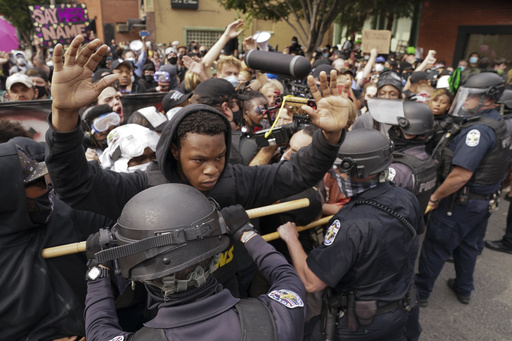
LOUISVILLE, Ky. — A police officer from Kentucky, who was shot during the protests following the death of Breonna Taylor in 2020, has filed a lawsuit against his police department. The officer, Robinson Desroches, claims in the suit that he faced discrimination from his superiors after voicing his opinions about the circumstances surrounding Taylor’s shooting.
In his lawsuit, which was submitted in Jefferson County, Desroches, who is Black, claims that fellow Black officers who speak about race or share their experiences related to racial issues are often portrayed as betrayers of “the thin blue line.” He alleges that his department made efforts to force him out after he candidly stated that the real reason for his shooting in the line of duty was, in his view, that “LMPD officers killed Breonna Taylor.” According to Desroches, one of his commanding officers criticized the extensive length of his rehabilitation following the injuries he sustained in the shooting.
The Louisville Police Department chose not to comment on the ongoing lawsuit, but issued a statement affirming its commitment to fostering an inclusive workplace. The statement emphasized its dedication to addressing allegations of harassment or discrimination seriously. The department noted that it aims to offer reasonable accommodations for employees injured while on duty, ensuring they are supported with alternative roles until they receive medical clearance to resume full duties.
Currently, Desroches is still an officer with the Louisville Police but is on leave, receiving workers’ compensation for issues related to his physical and mental health, as reported by his lawyer, Sara Collins. In September 2020, he was injured during violent protests that erupted after the announcement from former Kentucky Attorney General Daniel Cameron, indicating that the grand jury would not indict the officers involved in the fatal raid that led to Taylor’s death.
Desroches sustained a gunshot wound to the stomach, with the bullet narrowly missing his spine. His recovery took more than a year before he was able to return to work, albeit in a limited capacity. The other officer involved in the incident was not severely injured. Upon resuming his duties, Desroches was assigned to the recruitment division, but later, his superiors approached him with an offer to participate in media speaking engagements based on his experience.
In his lawsuit, Desroches contends that the department aimed to leverage his status as a Black officer shot during the protests to enhance the police department’s image and recruitment efforts. He declined the opportunity because he did not want his narrative to be distorted to present a misleading portrayal of the department, given his critical views. After this refusal, he claims his relationship with his superiors deteriorated, and he was not presented with a recruitment position once he returned to full-time employment. Furthermore, he was allegedly warned last year by a member of the command staff that “there was a target on his back.”
The person responsible for shooting Desroches, Larynzo Johnson, pleaded guilty in 2022 to several charges, including two counts of assault and multiple counts of endangerment, and was sentenced to 13 years in prison. Now, Desroches is pursuing both punitive and compensatory damages from the Louisville Police Department.
